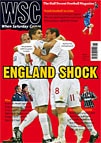 Having acquired sporting representatives in Austria and the US, Red Bull have turned to Germany. Paul Joyce assesses the fallout
Having acquired sporting representatives in Austria and the US, Red Bull have turned to Germany. Paul Joyce assesses the fallout
No city exemplifies the decline of East German football since reunification more starkly than Leipzig. Lokomotive Leipzig, European Cup-Winners Cup finalists in 1987, went bankrupt in 2004 and had to restart at the bottom of the league pyramid. They now play in the same fifth division as former GDR champions Sachsen Leipzig, who entered insolvency in March with debts of €3 million (£2.7m).
Incidents of right-wing hooliganism have also affected attendances. In 2006, Lok fans formed themselves into a human swastika during a youth-team match against Sachsen. “The devil himself could turn up right now and if he had a few million, they’d welcome him with open arms,” observed Matthias Gärtner from national fans’ organisation BAFF.
Enter Dietrich Mateschitz, the billionaire owner of Red Bull. Having ruthlessly rebranded teams in Salzburg and New York, Mateschitz persuaded SSV Markranstädt, a fifth-tier team from a small town ten kilometres south-west of Leipzig, to relinquish their playing rights in June to a new entity called RB Leipzig for a six-figure sum. To get round the rule preventing German clubs from bearing sponsors’ names, RB officially stands for RasenBallsport (Lawn Ball Sport), which sounds like a three-year-old struggling to describe tennis.
Although Saxony’s football association rejected the new club’s crest for being too similar to the Red Bull logo, Markranstädt’s colours have changed to their corporate red and white. Mateschitz has also bought the naming rights of Leipzig’s 44,000-capacity Zentralstadion, which was used in the 2006 World Cup. If they gain promotion this season, RB will then play in the Red Bull Arena.
“Our aim is to reach the Bundesliga in the next five to eight years,” said Mateschitz, who is prepared to invest €100m in the project. So far, Red Bull have seemed less heavy-handed than during their takeover of Austria Salzburg in 2005. New signings, such as former German international Ingo Hertzsch, have an East German background. RasenBallsport have also taken over Sachsen Leipzig’s youth academies, so that talented players “no longer have to go the west to be successful”, explains Hans-Georg Felder, RB Leipzig’s media spokesman. The head of Saxony’s football association even suggested that the region’s clubs should donate their best youngsters to RB, reviving painful memories of enforced player delegation under socialism.
“Red Bull will discover that German football can’t be compared with Austrian football,” predicts Peter Schur, Sachsen Leipzig’s supporters’ representative. “They’ll hit their limits by Division Three at the latest.” Sachsen’s fans successfully blocked Mateschitz’s takeover attempts in 2006, arguing that too much of their club’s tradition would be sacrificed. “Anyone who still has the romantic notion that you can reach the Bundesliga on tradition alone has been asleep for the last three years,” Felder counters.
Others have expressed their disapproval more forcefully. In June, the Markranstädt pitch was attacked with weedkiller and a wooden cross was erected in the centre circle with the words: “Football is dying here.” RB Leipzig players were spat at and pelted with bottles during their first league match at Carl Zeiss Jena II and fled afterwards, still in their kit, with a police escort.
Concerns have also been raised by top-flight clubs. Hans-Joachim Watzke, chief executive of Borussia Dortmund, asked: “Do we really want to celebrate Red Bull So-and-so winning the league?” Seeing a connection with the rise of Wolfsburg and Hoffenheim, who have wealthy backers but few supporters, Watzke fears that “the Bundesliga is losing something important. This will no longer be the football that the fans want.”
The clash of cultures was evident at Lokomotive v RB Leipzig in September. At least 9,000 of the 11,486 derby crowd were Lok fans, unfurling anti-Red Bull banners such as: “Football is for U and me – not for fucking industry.” But Lok president Steffen Kubald’s hopes that success for the underdogs might win over the neutrals were dashed by RasenBallsport’s comfortable
3-0 victory which kept them top of the table. A small pocket of RB supporters were also visible – the LE Bulls – whose spokesman Carsten Sand welcomes Red Bull’s arrival as a “unique opportunity to enjoy professional football without violence”. He hasn’t yet tried wearing an RB scarf in the streets of Leipzig, however.
Wherever Red Bull’s marketing roadshow turns up next, it seems less likely to be Britain. England was one of five countries in which Mateschitz considered buying a club in 2006, before settling on Germany. “But that plan has now been laid to rest”, said RB Leipzig’s Hans-Georg Felder.
From WSC 273 November 2009